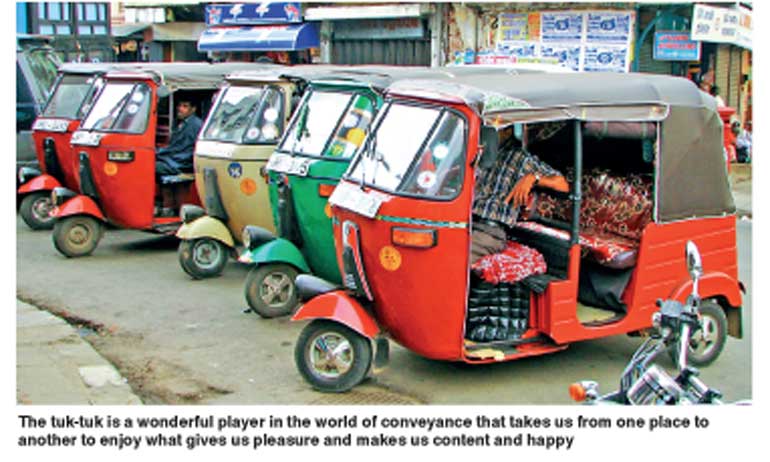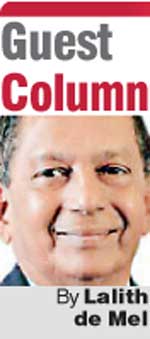Sunday Feb 22, 2026
Sunday Feb 22, 2026
Saturday, 11 November 2017 00:23 - - {{hitsCtrl.values.hits}}
 We all need some form of conveyance to get to work, to get to school, etc. That is a chore. It is not the fun bit in life. That feeling of being content and happy flows from doing things that give us pleasure.
We all need some form of conveyance to get to work, to get to school, etc. That is a chore. It is not the fun bit in life. That feeling of being content and happy flows from doing things that give us pleasure.
The tuk-tuk is a wonderful player in the world of conveyance that takes us from one place to another to enjoy what gives us pleasure and makes us content and happy. Those nice vibes of feeling good often flow from contact with other people, be they parents, siblings, children or friends, or from going shopping or visiting the cinema or watching sport. If we are unable to do these things as we have no means of getting to them, our quality of life will tumble downhill. The means of getting to them conveniently is an important contributor to our happiness.
Adam desperately wanted to meet Eve. The thoughts of Eve and the forbidden fruit sent a tingle down his spine. He had to travel to get to Eve. He repeatedly whistled for an Angel taxi. None came, as they knew he was after the forbidden fruit. In the end he had to use his two feet as that was only conveyance that would take him to Eve.
From that time to now many may find that the only form of conveyance available is their two feet but they will always look for some more comfortable means of conveyance. One of the earliest forms of conveyance that was better than walking was to get on the back of a horse. When Henry the V111 who was married to his brother’s widow Katherine of Aragon and got tired of playing the same violin, he fell in love with Anne Boleyn. Her father the Earl of Wiltshire had his castle in Wiltshire quite a distance from his palace at Hampton Court. So he went to seduce her on his horse.
The horse was one of many precursors of the tuk-tuk as a conveyance for meeting people for pleasure and in many parts of the world the horse was a popular form of conveyance. The pioneering tea planters visited their friends on neighbouring estates on horseback.
There is nothing in the literature about pioneering British planters riding bulls. The Sinhala kings would have gone on an elephant for a convivial chit chat.
The bicycle that was better than walking came into being only in the early 20th century. But then bicycles were expensive and the masses could not afford them. The Sri Lankan peasant too could not afford an elephant or horse or bicycle and walking was the only alternative.
Chairman Mao, determined to create an egalitarian society, addressed two issues – clothes and conveyance. Everybody wore a Mao suit and so there was no competition about getting a dress better than the neighbour. He solved the conveyance problem by giving everybody a bicycle.
Trains came in the late 19th century to Sri Lanka. It was primarily to take the tea to the port. One could not go by train to secretly meet a lover as the trains did not go to villages .The early tea planters went to meet their friends on nearby estates on horseback because there were no trains connecting estates.
A man called Hanson developed a small carriage drawn by a single horse in the mid-19th century. It was called the Hanson Cab and was the first taxi. It was this that led to taxis being referred to as cabs. This revolutionised the quality of life of people in London. The rich had their carriages and the rest had to walk through the dirty streets of London. The Hanson cab enabled the less rich to go to the pub or visit relatives or go to the theatre. It changed their quality of life.
In Sri Lanka, after the trains came, the rich went in their buggy carts to the station to get to Colombo. When they arrived in Colombo they took a rickshaw to get to their destination. After the rickshaw, the first motorised taxi was Quickshaws, but there were only a few of them. It was relatively recently that we had a lot of taxi companies but they are mainly in Colombo and only a sprinkling in the other big cities. So the greater mass of the not-so-rich population that did not own car or afford a taxi had to depend on the bus. Buses ran on main roads and on very few roads in the rural areas. If your destination was away from the bus route, one had to walk.
The tuk-tuk changed all this, from the cities to the depths of rural areas. When you want one, there is one. It is there where there are no taxis or buses. It gives the comfort of the knowledge that if someone falls sick and you need to get to hospital, there will be a tuk-tuk to take you there. If you have an interview at 10 a.m. you know a tuk- tuk will get you there on time. It is cheaper than a taxi and will not be held up in a traffic jams that do not move. The tuk-tuk is your helper in life who never fails to be there for you. And, if you are 21 and have no job and are wondering what to do, the answer comes in a flash – you can drive a tuk-tuk.
tuk will get you there on time. It is cheaper than a taxi and will not be held up in a traffic jams that do not move. The tuk-tuk is your helper in life who never fails to be there for you. And, if you are 21 and have no job and are wondering what to do, the answer comes in a flash – you can drive a tuk-tuk.
If an opinion poll is carried out to establish who or what contributed the most to our happiness in the last 10 years and you list MR, RW, MS and the mobile phone and the tuk-tuk, the result for sure will be a close contest between the mobile phone and the tuk-tuk. Perhaps the mobile phone will win in urban areas and the tuk-tuk in rural areas. The politicians will probably trail in far, far below these two. What a blow to lose to a tuk-tuk and mobile phone.
If a referendum is a carried out on the question of whether cars should be banned on key roads into the city from seven to nine and only tuk-tuks be permitted, I would not be surprised if the tuk wins. Perhaps we should have huge car parks on the fringe of major cities so that people can park their cars and take a tuk into the city.
Like the Hanson Cab that transformed the quality of life of many people in London in the 19th century, the tuk-tuk after it arrived has transformed the quality of life of many people.